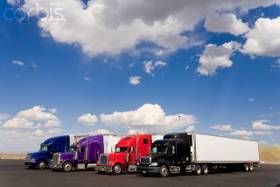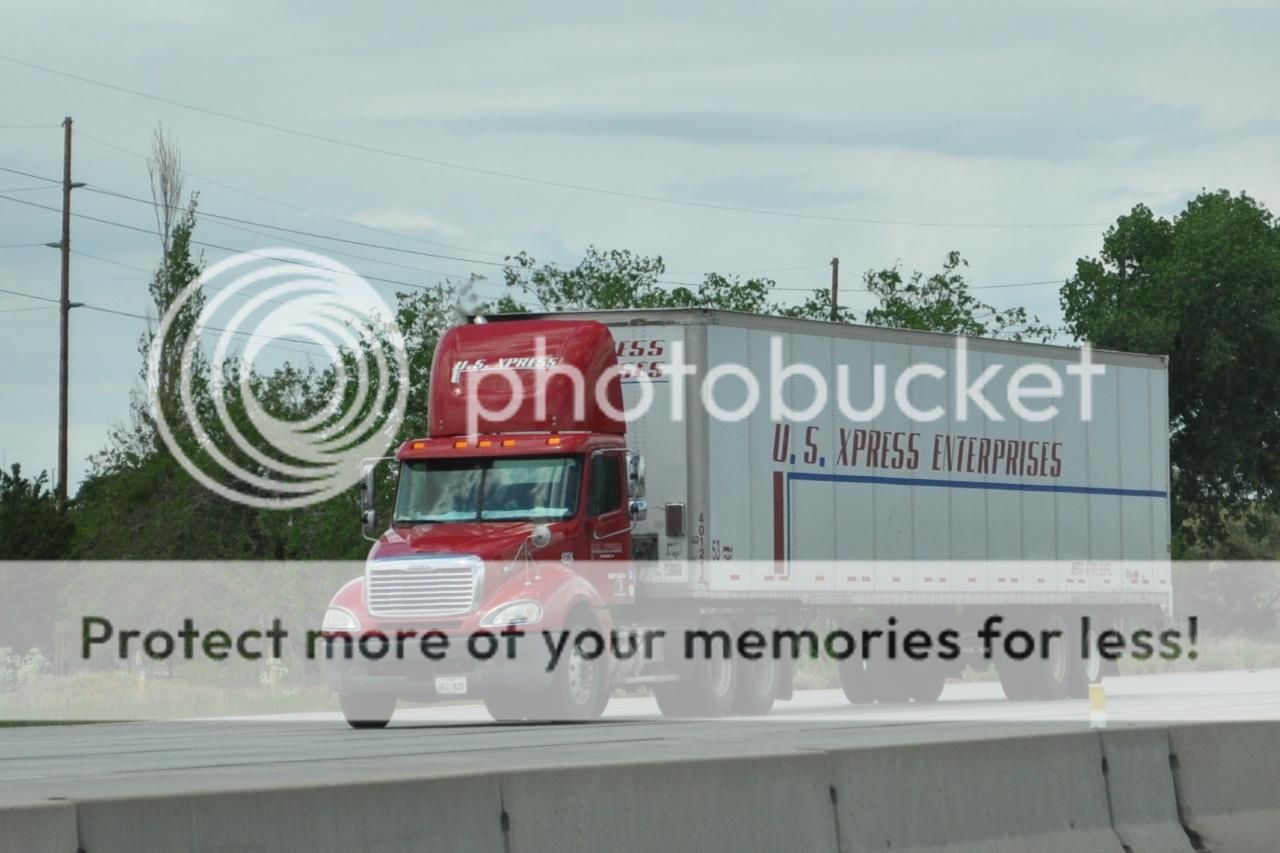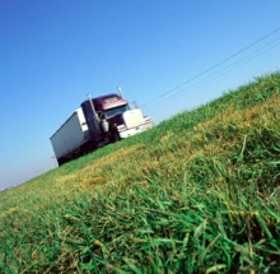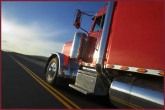Reefer, Flatbed, Or Tanker
Topic 3641 | Page 1

Most new drivers start with reefers...but there are companies that may start you on tankers. Its alot different than either reefer or drybox...and it takes alot of extra knowledge to pull one...
Reefer:
A refrigerated trailer.

Each type of freight has pros and cons. Some is preference, some depends on your geographical location, some on your health, etc.
I started in HazMat chemical tanker with Schneider. I loved it. There is physical labor involved in most tanker jobs; not too much drop and hook , usually you load and/or unload the product. You will be climbing up/down the tanker (so fear of heights will disqualify you), you will sling 20-40 lb. hoses around outdoors and indoors in all weather, and you will have to deal with up to 45,000 lb. of liquid moving around behind you.
If you are doing chemical tanker you have to deal with chemical plants and refineries. Additional safety requirements (like the dreaded pickle suit), face masks, gloves, and so on.
If you are doing food grade tanker you have to deal with... I don't know? Animal smells? Perhaps unpaved roadways in/around farm areas? I never did food grade, so no idea. But there are many types of food grade, so you could be hauling orange juice, milk, liquid sweeteners, liquid chocolate, or even alcohol. So it's not all sunny farmland in food grade, you may going to/from industrial food processing plants.
Most tanker jobs will require you to be very detail oriented, which you should be anyway as a professional driver. But there are added dangers and costs involved if you unload the wrong product into the wrong tank or at the wrong customer; not the same as bringing the wrong dry van or reefer trailer to the wrong place.
Starting out in tankers also limits your options to a few companies that hire new CDL holders to drive tanker, whereas picking reefer/dry van/flatbed gives you more options as far as number of companies.
CDL:
Commercial Driver's License (CDL)
A CDL is required to drive any of the following vehicles:
- Any combination of vehicles with a gross combined weight rating (GCWR) of 26,001 or more pounds, providing the gross vehicle weight rating (GVWR) of the vehicle being towed is in excess of 10,000 pounds.
- Any single vehicle with a GVWR of 26,001 or more pounds, or any such vehicle towing another not in excess of 10,000 pounds.
- Any vehicle, regardless of size, designed to transport 16 or more persons, including the driver.
- Any vehicle required by federal regulations to be placarded while transporting hazardous materials.
HAZMAT:
Hazardous Materials
Explosive, flammable, poisonous or otherwise potentially dangerous cargo. Large amounts of especially hazardous cargo are required to be placarded under HAZMAT regulations
Dry Van:
A trailer or truck that that requires no special attention, such as refrigeration, that hauls regular palletted, boxed, or floor-loaded freight. The most common type of trailer in trucking.Reefer:
A refrigerated trailer.
Drop And Hook:
Drop and hook means the driver will drop one trailer and hook to another one.
In order to speed up the pickup and delivery process a driver may be instructed to drop their empty trailer and hook to one that is already loaded, or drop their loaded trailer and hook to one that is already empty. That way the driver will not have to wait for a trailer to be loaded or unloaded.
HOS:
Hours Of Service
HOS refers to the logbook hours of service regulations.
Most new drivers start with reefers...but there are companies that may start you on tankers. Its alot different than either reefer or drybox...and it takes alot of extra knowledge to pull one...
Thanks for the heads up
Reefer:
A refrigerated trailer.

Each type of freight has pros and cons. Some is preference, some depends on your geographical location, some on your health, etc.
I started in HazMat chemical tanker with Schneider. I loved it. There is physical labor involved in most tanker jobs; not too much drop and hook , usually you load and/or unload the product. You will be climbing up/down the tanker (so fear of heights will disqualify you), you will sling 20-40 lb. hoses around outdoors and indoors in all weather, and you will have to deal with up to 45,000 lb. of liquid moving around behind you.
If you are doing chemical tanker you have to deal with chemical plants and refineries. Additional safety requirements (like the dreaded pickle suit), face masks, gloves, and so on.
If you are doing food grade tanker you have to deal with... I don't know? Animal smells? Perhaps unpaved roadways in/around farm areas? I never did food grade, so no idea. But there are many types of food grade, so you could be hauling orange juice, milk, liquid sweeteners, liquid chocolate, or even alcohol. So it's not all sunny farmland in food grade, you may going to/from industrial food processing plants.
Most tanker jobs will require you to be very detail oriented, which you should be anyway as a professional driver. But there are added dangers and costs involved if you unload the wrong product into the wrong tank or at the wrong customer; not the same as bringing the wrong dry van or reefer trailer to the wrong place.
Starting out in tankers also limits your options to a few companies that hire new CDL holders to drive tanker, whereas picking reefer/dry van/flatbed gives you more options as far as number of companies.
Thanks for this info! I'm not limiting myself to tanker just yet I guess I will explore all options.
CDL:
Commercial Driver's License (CDL)
A CDL is required to drive any of the following vehicles:
- Any combination of vehicles with a gross combined weight rating (GCWR) of 26,001 or more pounds, providing the gross vehicle weight rating (GVWR) of the vehicle being towed is in excess of 10,000 pounds.
- Any single vehicle with a GVWR of 26,001 or more pounds, or any such vehicle towing another not in excess of 10,000 pounds.
- Any vehicle, regardless of size, designed to transport 16 or more persons, including the driver.
- Any vehicle required by federal regulations to be placarded while transporting hazardous materials.
HAZMAT:
Hazardous Materials
Explosive, flammable, poisonous or otherwise potentially dangerous cargo. Large amounts of especially hazardous cargo are required to be placarded under HAZMAT regulations
Dry Van:
A trailer or truck that that requires no special attention, such as refrigeration, that hauls regular palletted, boxed, or floor-loaded freight. The most common type of trailer in trucking.Reefer:
A refrigerated trailer.
Drop And Hook:
Drop and hook means the driver will drop one trailer and hook to another one.
In order to speed up the pickup and delivery process a driver may be instructed to drop their empty trailer and hook to one that is already loaded, or drop their loaded trailer and hook to one that is already empty. That way the driver will not have to wait for a trailer to be loaded or unloaded.
HOS:
Hours Of Service
HOS refers to the logbook hours of service regulations.
Tanker is obviously the best choice though. Don't let the others convince you otherwise! 

If you take the time to read Brett's book he talks about the various kinds and some of the things associated with each, good and bad. I would suggest reading it. It helped me a lot. I'm leaning towards tankers. I have experience in the chemical manufacturing business and loading sulfuric acid onto tankers, so I know what is involved. I don't know how quickly Prime moves drivers into hauling tankers, but I'm not concerned about that. First it's learn to be an excellent driver and learning the ropes of the industry. When it happens, it happens.

If you take the time to read Brett's book he talks about the various kinds and some of the things associated with each, good and bad. I would suggest reading it. It helped me a lot. I'm leaning towards tankers. I have experience in the chemical manufacturing business and loading sulfuric acid onto tankers, so I know what is involved. I don't know how quickly Prime moves drivers into hauling tankers, but I'm not concerned about that. First it's learn to be an excellent driver and learning the ropes of the industry. When it happens, it happens.
FYI, Prime's tanker division is geographically restricted. Meaning they only run their tankers (food grade only) within a specific triangle. Last time I checked (just a few months ago) your (and my, Panama City) area was out of the triangle. Might want to give them a call if Prime tanker is what you are considering.
Indeed, my book (free online version!) covers that topic quite well. We also have a category of articles on How To Choose A Trucking Company and in that category you'll find an 8 part series I wrote comparing the different types of freight and different types of companies to drive for.
OOS:
When a violation by either a driver or company is confirmed, an out-of-service order removes either the driver or the vehicle from the roadway until the violation is corrected.

I'm not experienced yet so feel free to take my info with a grain of salt . I have done hundreds of hours of reading and this is what I have come up with .
Hazmat Tanker can potentially pay the best . Food grade tanker is also an option as well as bulk dry goods . Liquid Tanker has the downside of slosh and surge which can really elevate the stress level of a new driver . Liquid Tanker also has the highest danger factor because of the nature of cargo moving . You will have to climb to the top of the trailer , and during unload you will often be an active participant . Although backing is a required skill in all facets of tractor trailer driving tanker drivers won't see many 'docks' comparatively .
Dry Van and Reefer are bump the dock divisions . You will be subjected to the most frustrating backing maneuvers , consistently . Unless you are working for Dollar General/Family Dollar its unlikely that reefer or dry van will require much physical activity . Van and Reefer are the kites on the highways ...more likely to be affected by wind gusts . The upside here is you will become a backing pro , and over time very little will be out of your skill range . Its load and go !
Flatbed ...the choice I have made . Often times a much lower center of gravity than tank , van or reefer . There are lumber loads ofcourse,and some tall loads with bagged material on pallets which can react similarly to dry van and reefer in heavy winds . Less kite effect than dry reefer would be a pro in my eyes . Depending on the company your with its said you can make the same/similar $$ as van/reefer doing less miles . To some driving less miles for the same pay is a good thing . Infrequent docks as far as backing goes , but backing nonetheless . You will back into buildings though ! FMCSA requires that a flatbed operator stop and check his load during the first 1hr or 50 miles after going on duty/driving with a new load and every 150 mi or 3hrs after that . OR at any point his duty status changes . What this means is a flatbed driver should never get any grief from the company for stopping and checking a load , stretching his legs and getting out of the truck . This does not mean that dry van or reefer drivers get flack for stopping , but if you want to avoid being sedentary flatbed offers physical activity securing a load and then periodically after leaving a shipper .
There are more topics of each division available online . Other folks may offer information here to give you more details but the above is the basics from what I have learned . Hope is helps .
~S~
HAZMAT:
Hazardous Materials
Explosive, flammable, poisonous or otherwise potentially dangerous cargo. Large amounts of especially hazardous cargo are required to be placarded under HAZMAT regulations
Shipper:
The customer who is shipping the freight. This is where the driver will pick up a load and then deliver it to the receiver or consignee.
CSA:
Compliance, Safety, Accountability (CSA)
The CSA is a Federal Motor Carrier Safety Administration (FMCSA) initiative to improve large truck and bus safety and ultimately reduce crashes, injuries, and fatalities that are related to commercial motor vehicle
FMCSA:
Federal Motor Carrier Safety Administration
The FMCSA was established within the Department of Transportation on January 1, 2000. Their primary mission is to prevent commercial motor vehicle-related fatalities and injuries.
What Does The FMCSA Do?
- Commercial Drivers' Licenses
- Data and Analysis
- Regulatory Compliance and Enforcement
- Research and Technology
- Safety Assistance
- Support and Information Sharing
Fm:
Dispatcher, Fleet Manager, Driver Manager
The primary person a driver communicates with at his/her company. A dispatcher can play many roles, depending on the company's structure. Dispatchers may assign freight, file requests for home time, relay messages between the driver and management, inform customer service of any delays, change appointment times, and report information to the load planners.Dry Van:
A trailer or truck that that requires no special attention, such as refrigeration, that hauls regular palletted, boxed, or floor-loaded freight. The most common type of trailer in trucking.Reefer:
A refrigerated trailer.
New Reply:
New! Check out our help videos for a better understanding of our forum features

















Preview:
This topic has the following tags:
Choosing A Trucking Company







 TT On Facebook
TT On Facebook
Which truck should a new driver start out with? Which truck do you guys prefer? Anyone can give me some ups & downs about each type of truck? I am considering Tanker.